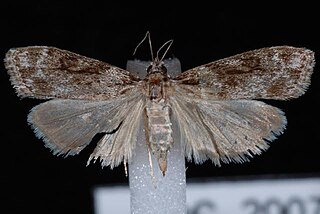
Eudonia is a large and widespread genus in the grass moth family (Crambidae), subfamily Scopariinae. There is no common name for the roughly 250 species placed here; new species are still being described regularly. Although the genus was proposed early in the 19th century, many of these moths were for a long time retained in Scoparia, the type genus of the subfamily and a close relative of Eudonia. A few small genera have been proposed for separation from Eudonia, but given the size of this group this is not particularly convincing; thus, all are retained here pending a comprehensive phylogenetic review.

Scoparia ancipitella is a species of moth in the family Crambidae. It is found in most of Europe. It has also been recorded from China.
Eudonia exterminata is a moth in the family Crambidae. It was described by Edward Meyrick in 1929. It is found on Rapa Iti in French Polynesia.
Eudonia abrupta is a moth in the family Crambidae. It was described by Wei-Chun Li in 2012. It is found in Jiangxi, China.

Eudonia spenceri is a moth in the family Crambidae. It was described by Eugene G. Munroe in 1972. It is found in North America, where it has been recorded from California and Arizona to Montana and British Columbia.
Eudonia cavata is a moth in the family Crambidae. It was described by Wei-Chun Li, Hou-Hun Li and Matthias Nuss in 2012. It is found in China.
Eudonia duospinata is a moth in the family Crambidae. It was described by Wei-Chun Li, Hou-Hun Li and Matthias Nuss in 2012. It is found in China and Taiwan.
Eudonia furva is a moth in the family Crambidae. It was described by Wei-Chun Li, Hou-Hun Li and Matthias Nuss in 2012. It is found in Yunnan, China.
Eudonia hexamera is a moth in the family Crambidae. It was described by Wei-Chun Li, Hou-Hun Li and Matthias Nuss in 2012. It is found in Sichuan, China.
Eudonia lijiangensis is a moth in the family Crambidae. It was described by Wei-Chun Li, Hou-Hun Li and Matthias Nuss in 2012. It is found in Yunnan, China.
Eudonia magna is a moth in the family Crambidae. It was described by Wei-Chun Li, Hou-Hun Li and Matthias Nuss in 2012. It is found in China.
Eudonia singulannulata is a moth in the family Crambidae. It was described by Wei-Chun Li, Hou-Hun Li and Matthias Nuss in 2012. It is found in China.
Eudonia zhongdianensis is a moth in the family Crambidae. It was described by Wei-Chun Li, Hou-Hun Li and Matthias Nuss in 2012. It is found in Yunnan, China.
Micraglossa beia is a moth in the family Crambidae. It was described by Wei-Chun Li, Hou-Hun Li and Matthias Nuss in 2010. It is found in China.
Micraglossa zhongguoensis is a moth in the family Crambidae. It was described by Wei-Chun Li, Hou-Hun Li and Matthias Nuss in 2010. It is found in China and northern Vietnam.
Scoparia brevituba is a moth in the family Crambidae. It was described by Wei-Chun Li, Hou-Hun Li and Matthias Nuss in 2010. It is found in Sichuan, China.
Eudonia rectilineata is a moth in the family Crambidae. It was described by Wei-Chun Li, Hou-Hun Li and Matthias Nuss in 2012. It is found in China.
Scoparia jiuzhaiensis is a moth in the family Crambidae. It was described by Wei-Chun Li, Hou-Hun Li and Matthias Nuss in 2010. It is found in Sichuan, China.
Scoparia spinosa is a moth in the family Crambidae. It was described by Wei-Chun Li, Hou-Hun Li and Matthias Nuss in 2010. It is found in China and Taiwan.
Scoparia uncinata is a moth in the family Crambidae. It was described by Wei-Chun Li, Hou-Hun Li and Matthias Nuss in 2010. It is found in the Chinese provinces of Gansu, Hubei, Shaanxi and Sichuan.


